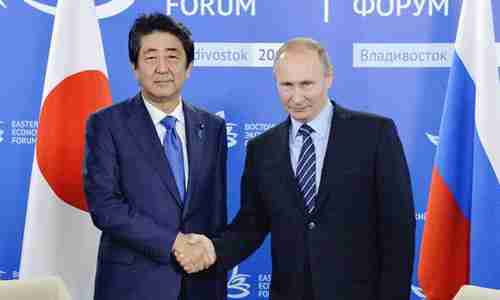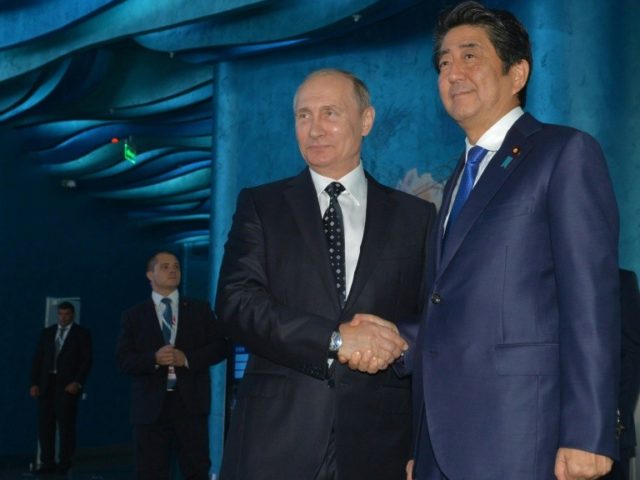This morning’s key headlines from GenerationalDynamics.com
- Japan and Russia may settle post-World War II Kuril Islands dispute
- Reading between the lines: Russia, Japan, China, India and border disputes
Japan and Russia may settle post-World War II Kuril Islands dispute

Shinzo Abe and Vladimir Putin on Friday
Both Japan and Russia seem determined to resolve the last major issue that has kept the countries from signing a peace treaty to formally mark the end of World War II.
When World War II ended in 1945 with Japan’s surrender, Russia annexed four islands in Japan’s Northern Territory, known to Russia as the Kuril Islands. The Soviet Union and Japan reestablished diplomatic relations in 1956, but they failed at that time to resolve the island dispute. In fact, over the decades, there have been multiple attempts at negotiating a resolution to the dispute, but those attempts have all been derailed for various reasons. The most recent attempt occurred in 2014, but that was derailed as well because Japan had to withdraw because of international sanctions imposed on Russia, after Russia invaded and annexed Ukraine’s Crimean peninsula.
However, this week there was outreach from both sides to resolve the issue, culminating in a meeting on Friday between Russia’s president Vladimir Putin and Japan’s prime minister Shinzo Abe. The meeting took place in Vladivostok, a port city in Russia’s Far East. Abe’s trip to Vladivostok was a rare visit to Russia by a Western leader, in view of the sanctions.
In an interview prior to the meeting, Putin that Russia “would very much like to find a solution to this problem with our Japanese friends”:
We do not trade territories although concluding a peace treaty with Japan is certainly a key issue and we would like to find a solution to this problem together with our Japanese friends. …
It has nothing to do with any kind of exchange or sale. It is about the search for a solution when neither party would be at a disadvantage, when neither party would perceive itself as conquered or defeated.
Friday’s talks continue a discussion that began at a meeting between the two leaders in May, in which Abe was said to be trying an entirely “new approach” to reach an agreement. At the talks, Abe laid out an eight-point plan for cooperating in the revitalization of the Russian Far East, including energy development and the construction of state-of-the-art hospitals among other areas.
In return, Abe will ask for return of two of the four disputed islands, while continuing talks on the fate of the other two, say sources.
At Friday’s Vladivostok meeting, Abe said:
I had substantially deep discussions about a peace treaty (with Putin). To achieve a breakthrough in the abnormal situation where a peace treaty has never been concluded for over 70 years, there is no other way than finding a solution based on the leaders’ trust. …
I believe the development of the Far East region with big potential is Russia’s top priority issue. The growth of the Asia-Pacific leads the global economy. Japan, as Russia’s neighbor, will promote Japan-Russia cooperation in the region strongly.
However, analysts say that whatever economic incentives Abe offers, they will almost certainly not be enough to overcome the strong nationalistic feelings of the Russian people toward ownership of the Kuril Islands.
There are plans to talk again, when Putin visits Japan on December 18. Siberian Times and Nikkei (Tokyo) and Japan Times (7-May) and Kyodo
Reading between the lines: Russia, Japan, China, India and border disputes
When we try to analyze the intentions of different nations from the point of view of Generational Dynamics, we use a variety of analytical and historical tools. If two neighboring countries are headed for a major war, the chances are that border disputes will become a major casus belli that both sides will use to justify the war, in order to excuse and explain the mutual extermination of their civilians. Thus, any behaviors exhibited prior to any war can be analyzed as a strong sign of the intensity of a future war.
As we look at various border disputes around the world, we see some very dramatic and stark differences.
Japan and Russia were enemies during World War II, and yet their current discussions of the Kuril Islands are anything but hostile. Even if it takes time to reach an agreement, the compromising and conciliatory tone of the negotiations, and the fact that negotiations are taking place at all, suggest that these two nations will not be going to war.
Now contrast that with China’s various border disputes – with Japan in the East China Sea, with Vietnam and the Philippines in the South China Sea, and with India over their land border. No one would ever accuse the Chinese of being conciliatory.
China is militarizing the South China Sea by building artificial islands and annexing regions belonging to other countries.
Last month, China used a different technique to militarize the East China Sea. It sent a huge fleet of 240 fishing boats to the region around Japan’s Senkaku Island, and then used the fishing boats as an excuse to send in over a dozen military patrol boats, presumably to “protect” the fishing boats.
One doesn’t have to be a psychic to see that while Russia is NOT headed to war with Japan, China IS headed for with Japan, as well as with Vietnam and the Philippines.
Similarly, China has ruled out any negotiations with a very bitter border dispute with India. It’s clear that China is also headed to war with India.
On the other hand, China also has a border disagreement with Pakistan, but there’s no vitriol over that, as both countries describe their relationship as “all-weather friends,” “deeper than the deepest ocean,” “sweeter than honey” and “dearer than eyesight.” Tass (Moscow, 8-Aug) and Reuters (9-Aug) and India Today (17-July)
Related Articles
- Philippines humiliates China in harsh Hague Tribunal ruling over South China Sea (13-July)
- Saudi Arabia, Pakistan, China sign economic and military agreements (1-Sep)
KEYS: Generational Dynamics, Russia, Japan, Northern Territory, Kuril Islands, Vladimir Putin, Abe Shinzo, Vladivostok, China, India, Senkaku Islands, Vietnam, Philippines, Pakistan
Permanent web link to this article
Receive daily World View columns by e-mail

COMMENTS
Please let us know if you're having issues with commenting.